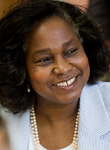Cornell aggressively addresses the needs of those on campus with disabilities
By Lynette Chappell-Williams

This article is the first in a series of Cornell Perspectives on diversity and inclusiveness concerns that will appear periodically in the Cornell Chronicle.
With such campus organizations as Cornell Union for Disabilities Awareness, the Disabilities Services Team and Cornell Minds Matter, the university has a structure for increasing the awareness of disability access on campus. Soon, Cornell will complement that structure with a disability strategic plan to comprehensively address access in education, employment and campus operations on campus.
Some 15 percent of Americans, according to the U.S. Census, has some kind of disability, up from almost 10 percent a decade ago, according to Cornell's Employment and Disability Institute (EDI). That number is likely to grow as more injured military personnel return from war zones and the population ages.
At Cornell, the number of veterans, many with disabilities, on campus as students is also expected to increase. That is partly because the U.S. Department of Veterans Affairs has designated Cornell as a Yellow Ribbon Program institution, meaning that the university and the VA will fund tuition expenses that exceed the highest public in-state undergraduate tuition rate.
The anticipated increase in students with disabilities (about 5 percent of the student population currently self-identifies as having a disability), as well as faculty and staff, provides the framework for Cornell's aggressive strategy to address the needs of our campus community for access. The disability strategic plan, the result of six years of study, focuses on physical access of the campus, educational services for those taking classes or workshops, employment (including student employment), communications, technology, and emergency planning and evacuation. For an overview of this commitment to disability access see http://www.cornell.edu/disability.
Programs already in place have garnered such recognition for Cornell as being a "best organization" for individuals with disabilities by New York state's Vocational and Educational Services for Individuals with Disabilities. Such programs include the provision to provide reasonable accommodations for faculty, staff and students with disabilities; create a disability services informational Web page; and implement an online map of accessible paths of travel and building entrances.
The Office of Workforce Diversity and Inclusion will work with Kappy Fahey, director of Student Disability Services and Andrea Haenlin-Mott, ADA coordinator of facilities, to implement the disability strategic plan. The plan spells out such objectives as: creating resources to assist the Cornell community with providing access for those with disabilities; enhancing accessibility to public events; and making significant changes in the way Cornell communicates these changes. The biggest challenge, say strategic plan leaders, will be raising the awareness of disability access within the Cornell community to make it second nature to think about access for every communication, student program, class and university event.
"Cornell's commitment to improving the experience of people with disabilities has now also begun to permeate our educational offerings," says Susanne Bruyere, director of the Employment and Disability Institute in the ILR School. "Over the past two years, several courses have been introduced into the Cornell curriculum to broaden student awareness of the disability experience and disability issues."
She cites such ILR courses as An Introduction to Disability Studies and Employment and Disability Policy, and Universal Design: Ergonomics and Accessibility in the College of Human Ecology. Other courses being planned include Literature and Disability, Disability and Law, International Disability Policy, and Ethics and Disability.
Says Bruyere: "It is hoped that exposure to the information in these courses will contribute to the preparation of a future cohort of young professionals across many disciplines, whose awareness of disability issues will lessen the discrimination that people with disabilities experience globally."
Lynette Chappell-Williams is associate vice president for workforce diversity and inclusion.
Media Contact
Get Cornell news delivered right to your inbox.
Subscribe